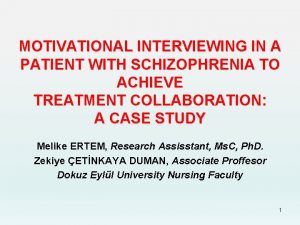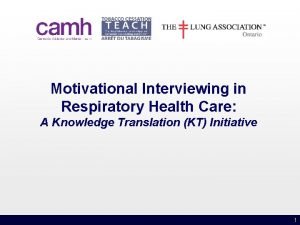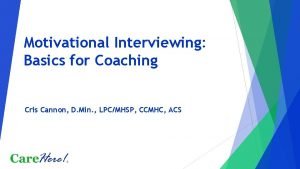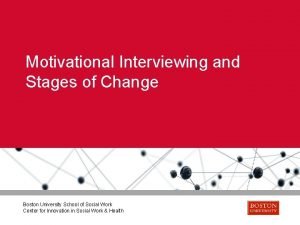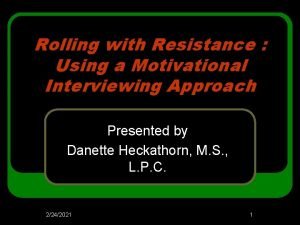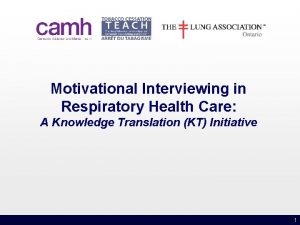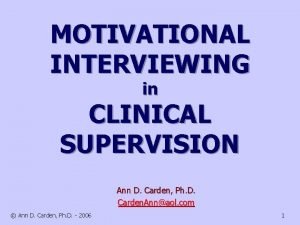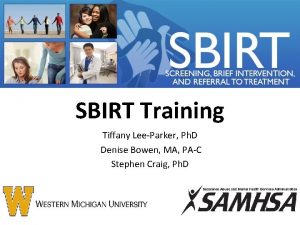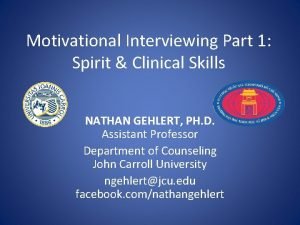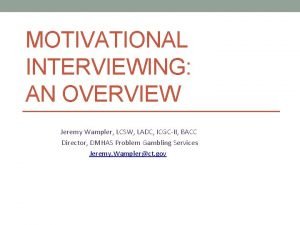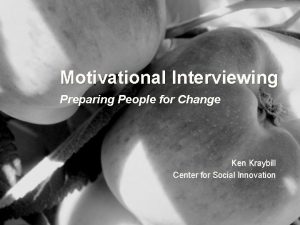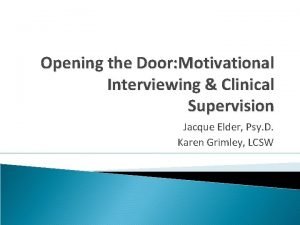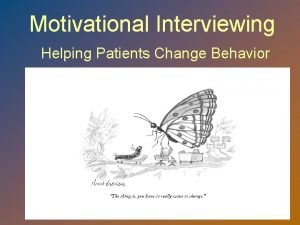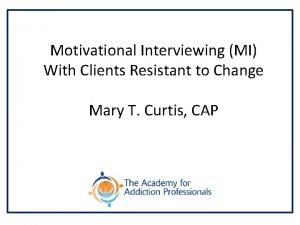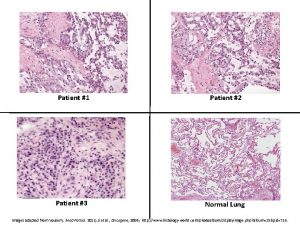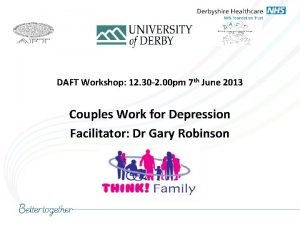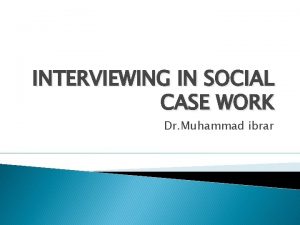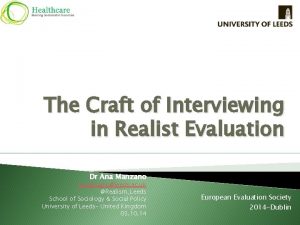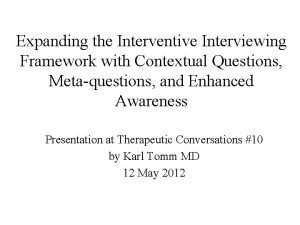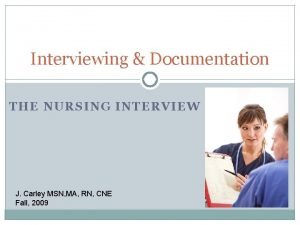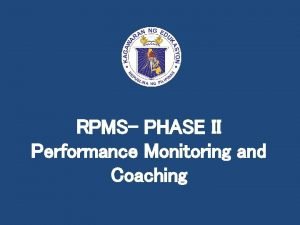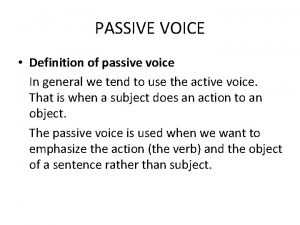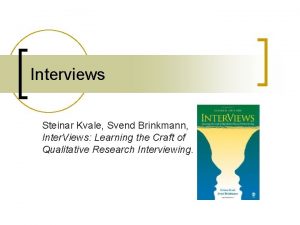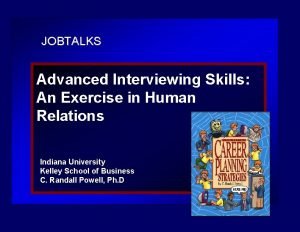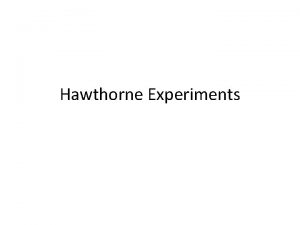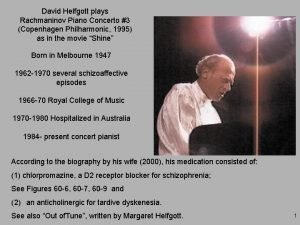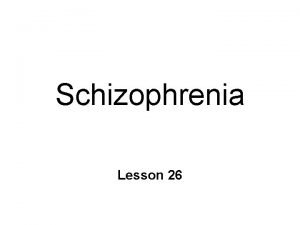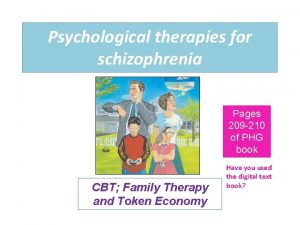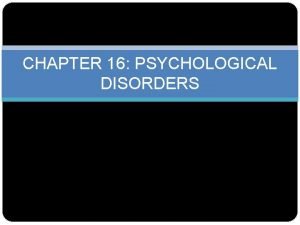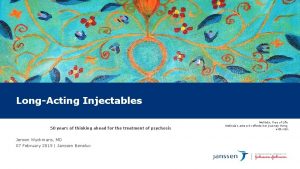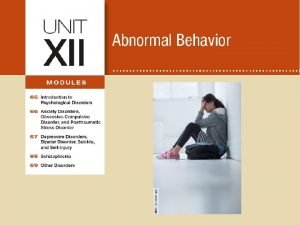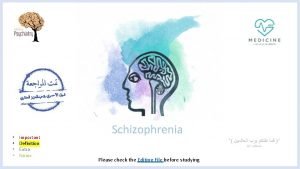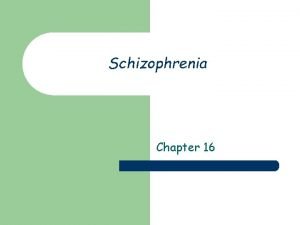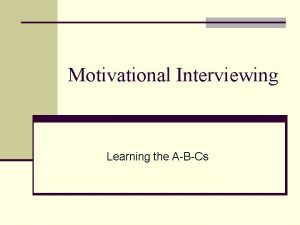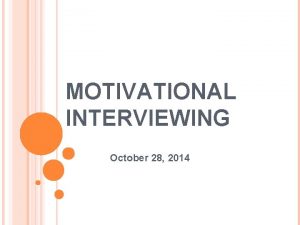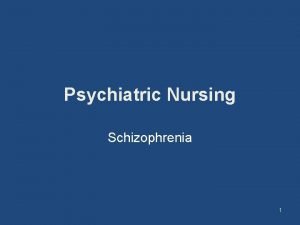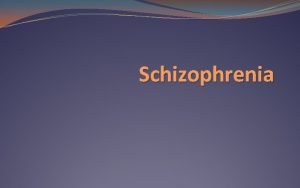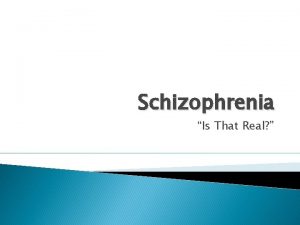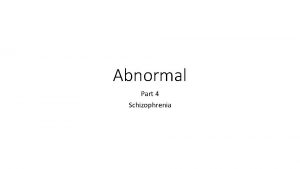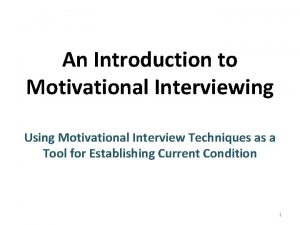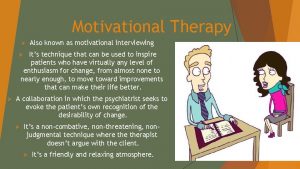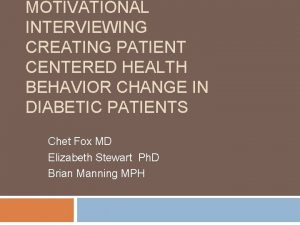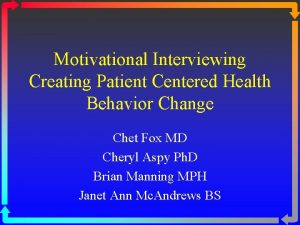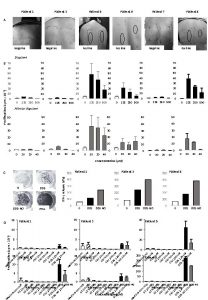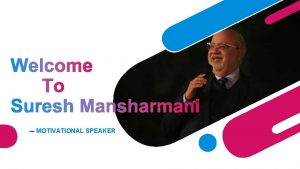MOTIVATIONAL INTERVIEWING IN A PATIENT WITH SCHIZOPHRENIA TO


























































- Slides: 58

MOTIVATIONAL INTERVIEWING IN A PATIENT WITH SCHIZOPHRENIA TO ACHIEVE TREATMENT COLLABORATION: A CASE STUDY Melike ERTEM, Research Assisstant, Ms. C, Ph. D. Zekiye ÇETİNKAYA DUMAN, Associate Proffesor Dokuz Eylül University Nursing Faculty 1

Medication nonadherence in patients diagnosed with schizophrenia may result Ø deterioration of psychotic symptoms, Ø a five-fold increase in the risk of relapse, Ø lengthened hospital stays, Ø comorbid substance abuse, Ø increased suicidal and Ø homicidal tendencies and Ø violent behavior 3. World Congress on Pharmacology, August 8 -10 2016, Birmingham UK 2

The reasons for medication nonadherence • • • Lack of insight about their disease(s); psychopathology at a psychotic level; fear related to medication use; intolerable disease course; undesirable side effects 3. World Congress on Pharmacology, August 8 -10 2016, Birmingham UK 3

The reasons for medication nonadherence (continued) • The complexity of adherence for a given treatment regimen • Insufficient social support • Financial difficulties • Lack of information about treatment or misinterpretations of treatment • Perceived difficulties of medication use conflicting 3. World Congress on Pharmacology, August 8 -10 2016, Birmingham UK 4

The reasons for medication nonadherence (continued) • Environmental factors in the hospital or residential neighborhood; • Pre-existing negative attitude toward medications and mental diseases; • Cultural beliefs • Lack of knowledge or misconceptions about the disease(s) and management 3. World Congress on Pharmacology, August 8 -10 2016, Birmingham UK 5

• Motivational Interview (MI) is an emerging therapeutic approach to increase medication adherence. 6 3. World Congress on Pharmacology, August 8 -10 2016, Birmingham UK

METHODS • In this case study, we examined the process of enhancing treatment collaboration through the use of MI in a patient diagnosed as schizophrenic and resistant to treatment. • Patient Ö. N. was followed in the Schizophrenia Outpatient Clinic of Dokuz Eylül University Hospital. 3. World Congress on Pharmacology, August 8 -10 2016, Birmingham UK 7

Measurements • The Morisky Medication Adherence Scale • The Drug Attitude Inventory 3. World Congress on Pharmacology, August 8 -10 2016, Birmingham UK 8

Motivational Interviews: • 45 minutes to 1 hour, • One-to-one and face-to-face • Once a week for 6 weeks 3. World Congress on Pharmacology, August 810 2016, Birmingham UK 9

Preparation Process • The researcher participated in a 20 -hour course, including supervision on MI from an MI specialist. • After each interview, the counselor and the researcher evaluated the content of the interview and requested advice from an experienced specialist. 3. World Congress on Pharmacology, August 8 -10 2016, Birmingham UK 10

Case Presentation • Ö. N. was male, 22 years old and a university student. • He stopped attending his university classes at the end of the first academic year due to his inability to focus on his studies. 11 3. World Congress on Pharmacology, August 8 -10 2016, Birmingham UK

Case Presentation • The patient did not take his prescribed medications regularly • He was unwilling to take them on his own. • He only took medication under the supervision of his parents. 3. World Congress on Pharmacology, August 8 -10 2016, 12

Case Presentation • He had been hospitalized at his own request, • He complained of fatigue, opposition, unhappiness, and introversion, • He exhibited decreased self-care, decelerated movements and impaired function. 3. World Congress on Pharmacology, August 8 -10 2016, Birmingham UK 13

Case Presentation • He stared into space, stood motionless and was unable to speak. • Doctors determined his final diagnosis to be schizophrenia (for 2 years) 3. World Congress on Pharmacology, August 8 -10 2016, Birmingham UK 14

• After discharge, he regularly attended doctor's follow-up visits in the schizophrenia outpatient clinic. • He was prescribed antidepressant, anxiolytic and antipsychotic drugs. 3. World Congress on Pharmacology, August 8 -10 2016, Birmingham UK 15

Examination of Mental Status • He had hallucinations in which he received messages from the television, noticeable thought blocking/alogia • The flat affect • Considerable psychomotor retardation • He answered the questions without any additional dialog 3. World Congress on Pharmacology, August 8 -10 2016, Birmingham UK 16

INTERVIEWS 3. World Congress on Pharmacology, August 8 -10 2016, Birmingham UK 17

INTERVIEWS Step 1: Creation of Motivation (Interviews 1, 2, 3 and 4) 3. World Congress on Pharmacology, August 8 -10 2016, Birmingham UK 18

Interview 1 The patient was given information about the aim of the study and the process, content of the interviews. He was also asked to complete: ü The Morisky Medication Adherence Scale ü Drug Attitude Inventory 3. World Congress on Pharmacology, August 8 -10 2016, Birmingham UK 19

Morisky Medication Adherence Scale-“Yes” ü I stop taking medications when I feel good; ü I stop taking medications when I feel bad; ü I forget to take my medications on time LOW ADHERENCE!! 3. World Congress on Pharmacology, August 8 -10 2016, Birmingham UK 20

Interview 1 • He marked the response “Always” to the statements in the Drug Attitude Inventory: 3. World Congress on Pharmacology, August 8 -10 2016, Birmingham UK 21

“I have difficulty using medications (dividing drugs, changes in doses of drugs, taking multiple drugs and taking the wrong medication)”, “Taking drugs makes me tired and lethargic”, “My family and friends remind me to take my medication”, “I think taking drugs for a long time has harmful effects (constipation, increased appetite, weight gain, difficulty in concentrating, etc. )” and “I become addicted to drugs if I take them for a long time”. 22

Interview 2 The questions focused on Improving the patient's understanding of the symptoms of schizophrenia Evaluating the barriers to take the prescribed medications regularly Examining the benefits and side effects of the prescribed treatment. 3. World Congress on Pharmacology, August 8 -10 2016, Birmingham UK 23

At the Did not believe that the beginning of the interview antidepressant and antipsychotic drugs that he took were useful Although he did not want to take his medications, he felt that he had to. He did not want to take them, but took them upon his parents' requests. He stated that he had difficulty swallowing his medications 24 3. World Congress on Pharmacology, August 8 -10 2016, Birmingham UK

He said; • “My parents say, if I stop taking them, I may feel bad” asked, “doesn’t taking the medications lead to addiction? ” • “I felt depressed and as if my spirit left my body”. 3. World Congress on Pharmacology, August 8 -10 2016, Birmingham UK 25

Interview 3 -4 • Further efforts were undertaken to improve the patient's understanding of the disease • Evaluate and determine the side effects and benefits of treatment • The side effects of each drug given to the patient were discussed. 3. World Congress on Pharmacology, August 8 -10 2016, Birmingham UK 26

Interview 3 -4 • The patient described the side effects of the drugs as unwanted and negative and aligned them with symptoms of schizophrenia. 3. World Congress on Pharmacology, August 8 -10 2016, Birmingham UK 27

Interview 3 -4 • At this stage, we used open-ended and reflective interview questions to help the patient to distinguish symptoms from side effects and to raise awareness of side effects and disease symptoms. • Confidence and Self-Efficacy Test was used 3. World Congress on Pharmacology, August 8 -10 2016, Birmingham UK 28

He suffered from side effects: ü Lethargy, ü Weight gain, ü Inability to concentrate, ü Addictive effects, ü Headache, ü Shortness of breath, ü Burning sensation in the eyes, ü Pain in the arms and legs and pain throughout the whole body 29 3. World Congress on Pharmacology, August 8 -10 2016, Birmingham UK

He mentioned the positive effects of treatment: ü Decreased severity of sleep problems, ü Better mood ü Improved ability to communicate 3. World Congress on Pharmacology, August 8 -10 2016, Birmingham UK 30

q. He was given an assignment to compare the positive and negative effects of his treatment using the ruler method and to rate the severity of the side effects and effects of his treatment. q. The objective of this assignment was to make him aware of the effects and side effects of his treatment on his body along with their severity and importance. 31 3. World Congress on Pharmacology, August 8 -10 2016, Birmingham UK

Interview 3 -4 • The researcher asked the patient to rate the effects of his treatment and the severity of his side effects again. • The differences between his ratings at home and those at the interview were compared, and the changes were evaluated carefully. 3. World Congress on Pharmacology, August 8 -10 2016, Birmingham UK 32

Interview 3 -4 • The researcher explained that Ö. N. was now more aware of the importance of adhering to his treatment and coping with the side effects of his medications. • His experiences were discussed, and • He was encouraged to implement change. 3. World Congress on Pharmacology, August 8 -10 2016, Birmingham UK 33

Step 2: • Strengthening the Promise to Change (Interviews 5 and 6) 3. World Congress on Pharmacology, August 8 -10 2016, Birmingham UK 34

Interview 5 • At this interview, the patient's worries about starting to work and earning his own living were discussed. 3. World Congress on Pharmacology, August 8 -10 2016, Birmingham UK 35

His feelings (worries, regrets and fear of the unknown, etc. ) The meaning of being successful at work, ways to succeed and the role of success at school and in his future career 3. World Congress on Pharmacology, August 8 -10 2016, Birmingham UK 36

Interview 5 The patient said that although he understood that success at school would play an important role in his career and in earning his own living, he admitted that he failed at school. 3. World Congress on Pharmacology, August 8 -10 2016, Birmingham UK 37

Interview 5 • Failure and the accompanying factors were discussed • The role of treatment was questioned • The patient wanted time to think about the issue and agreed to talk about it at the next interview 3. World Congress on Pharmacology, August 8 -10 2016, Birmingham UK 38

Interview 5 • The focus of the interview was to help the patient accept the side effects of the treatment 3. World Congress on Pharmacology, August 8 -10 2016, Birmingham UK 39

Interview 5 • The patient noted that he had difficulty taking oral medications; • He said that during his previous hospitalization, drugs were administered by injection, a satisfactory method in his opinion. • Therefore, he requested consideration for being prescribed an injectable form of his antipsychotic drug and time to think about it. 3. World Congress on Pharmacology, August 8 -10 2016, Birmingham UK 40

Interview 5 • The researcher and patient discussed alternative forms of drug administration • They clarified the goals of his treatment at the next interview • They agreed to discuss these topics again at the next meeting. 3. World Congress on Pharmacology, August 8 -10 2016, Birmingham UK 41

Interview 5 • Following this interview, the doctor responsible for the patient's treatment was informed about the patient's desire for an injectable form of the antipsychotic drug and agreed that this was a possibility. 3. World Congress on Pharmacology, August 8 -10 2016, Birmingham UK 42

Interview 6 • The aim of this interview was to support the patient's success in the continuation of his treatment, to focus on being healthy and to evaluate effectiveness of prophylactic or maintenance therapy. 3. World Congress on Pharmacology, August 8 -10 2016, Birmingham UK 43

Interview 6 • At the end of the interview, the patient had changed his mind and decided to fully collaborate with the health staff in his treatment. 3. World Congress on Pharmacology, August 8 -10 2016, Birmingham UK 44

Interview 6 • He verbalized an awareness of the negative aspects of his current status and the advantages of a change in his behavior. • He noted that he could use the injectable form of his drug more easily and that the oral form of his drug could be replaced by an injectable form. 3. World Congress on Pharmacology, August 8 -10 2016, Birmingham UK 45

DISCUSSION • The aim of this case study was to improve patient collaboration with a researcher for a treatment-resistant patient with schizophrenia. 3. World Congress on Pharmacology, August 8 -10 2016, Birmingham UK 46

• Although he was educated about his medication and the side effects during clinical treatment by his doctor, he was ambivalent about his medication and, therefore, nonadherent. • Because he had features which were directly related to MI, this approach was practiced for this case. 3. World Congress on Pharmacology, August 8 -10 2016, Birmingham UK 47

• At the beginning of the MI process, Ö. N. revealed his ambivalent feelings about his treatment. • His awareness was raised by developing a discrepancy to facilitate distinguishing between treatment side-effects and disease symptoms. 3. World Congress on Pharmacology, August 8 -10 2016, Birmingham UK 48

• The positive and negative effects of his treatment on his body and life were assessed and then discussed based on the patient's responses for the importance, confidence and self-efficacy ruler. 3. World Congress on Pharmacology, August 8 -10 2016, Birmingham UK 49

The patient came to understand his confidence level for coping with the negative and positive effects of treatment using homework assignments to facilitate better comprehension for both of these pieces of the puzzle 3. World Congress on Pharmacology, August 8 -10 2016, Birmingham UK 50

• For this case, MI was effective in providing support for medication use and achieving treatment collaboration in this patient with schizophrenia. 3. World Congress on Pharmacology, August 8 -10 2016, Birmingham UK 51

Suggestions • Psychiatric mental health practitioners should consider the application of MI in their medication management sessions to improve patients' responses to treatment. 3. World Congress on Pharmacology, August 8 -10 2016, Birmingham UK 52

Suggestions • Brief MI can be included during any of the patient visits to establish treatment collaboration with patients as long as the provider has experience with limiting the length of the interaction at psychiatric facilities, outpatient clinics and community mental health centers. 3. World Congress on Pharmacology, August 8 -10 2016, Birmingham UK 53

Suggestions This technique should be incorporated into curricula for Ph. D programs in nursing to enhance the knowledge and skills of the nurses and nurse educators. 3. World Congress on Pharmacology, August 8 -10 2016, Birmingham UK 54

THANK YOU FOR ATTENTION 3. World Congress on Pharmacology, August 8 -10 2016, Birmingham UK 55

56

57

58
 Motivational interviewing schizophrenia
Motivational interviewing schizophrenia Darn cat motivational interviewing
Darn cat motivational interviewing Cris cannon
Cris cannon Stages of change social work
Stages of change social work Motivational interviewing case management
Motivational interviewing case management Reds motivational interviewing
Reds motivational interviewing Roll with the resistance
Roll with the resistance Readiness ruler motivational interviewing
Readiness ruler motivational interviewing Darn cat motivational interviewing
Darn cat motivational interviewing Dears motivational interviewing
Dears motivational interviewing Darn cat motivational interviewing
Darn cat motivational interviewing Motivational interviewing
Motivational interviewing Darn cat motivational interviewing
Darn cat motivational interviewing Contoh motivational interviewing
Contoh motivational interviewing Motivational interviewing
Motivational interviewing Motivational interviewing ears
Motivational interviewing ears Jeremy wampler
Jeremy wampler Motivational interviewing
Motivational interviewing Motivational interviewing preparing people for change
Motivational interviewing preparing people for change Motivational interviewing
Motivational interviewing Motivational interviewing dears
Motivational interviewing dears Dares motivational interviewing
Dares motivational interviewing Change talk worksheet
Change talk worksheet Motivational interviewing stages of change
Motivational interviewing stages of change Krishna guadalupe
Krishna guadalupe Agreement with a twist motivational interviewing
Agreement with a twist motivational interviewing Change talk
Change talk Patient 2 patient
Patient 2 patient Karl tomm questions
Karl tomm questions Performance based interviewing
Performance based interviewing Interviewing techniques social work
Interviewing techniques social work The craft of interviewing in realist evaluation
The craft of interviewing in realist evaluation Karl tomm interventive interviewing
Karl tomm interventive interviewing Ten traps of interviewing
Ten traps of interviewing Interviewing candidates chapter 7 ppt
Interviewing candidates chapter 7 ppt Interviewing in action in a multicultural world
Interviewing in action in a multicultural world Performance monitoring and coaching form template
Performance monitoring and coaching form template The professor told him not to talk in class passive voice
The professor told him not to talk in class passive voice Interviewing techniques definition
Interviewing techniques definition Kvale seven stages of interviewing
Kvale seven stages of interviewing Chapter 7 interviewing candidates
Chapter 7 interviewing candidates Intensive interviewing
Intensive interviewing Interview techniques for journalists
Interview techniques for journalists Advanced interviewing techniques
Advanced interviewing techniques Mica splitting test room
Mica splitting test room Example of
Example of Psychodynamic perspective of schizophrenia
Psychodynamic perspective of schizophrenia Genes schizophrenia
Genes schizophrenia Schizophrenia
Schizophrenia Donnie darko schizophrenia
Donnie darko schizophrenia Two years ago jenny was diagnosed with schizophrenia
Two years ago jenny was diagnosed with schizophrenia Schizophrenia def
Schizophrenia def Schizophrenia warning signs
Schizophrenia warning signs Efficcity
Efficcity Types of schizophrenia
Types of schizophrenia Schizophrenia
Schizophrenia Module 68 schizophrenia
Module 68 schizophrenia Definition of schizophrenia
Definition of schizophrenia Nursing care plan for schizophrenia pdf
Nursing care plan for schizophrenia pdf
